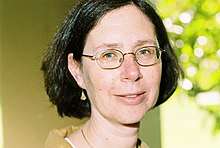Susan Eisenbach
Susan Eisenbach is a Professor of Computer Science at Imperial College London. She is interested in how to produce good software systems that behave appropriately.
Susan Eisenbach | |
|---|---|
 | |
| Employer | Imperial College London |
| Known for | Programming |
Education
Eisenbach completed an undergraduate degree in Mathematics at Vassar College.[1] She completed MScs in Mathematical Logic and in Computer Science at the University of London, before working as a school maths teacher.[1]
Career
Eisenbach joined the Department of Computing, Imperial College London in September 1983. In 1994 she was appointed Director of Studies, a role she held for 15 years, with overall responsibility for teaching.[2] She took a college wide role as Dean of Teaching and Learning in 2010.[3] In January 2011 she was made Head of the Department of Computing, which she completed September 2016.[4] Currently she is the elected member on College Council.
She has published several books on programming. In 1981 she published PASCAL for Programmers.[5] She published Program Design With Modula-2 in 1989.[6] She published Reasoned Programming in 1994.[7] Eisenbach's research focuses on how to produce concurrent programs that behave properly.[8][9][10][11]
She has championed entrepreneurship amongst the student community.[12] She is an advisor to the computer education program "The Turing Lab", a partnership between Imperial College London graduates and YOOX Net-a-Porter Group.[13] Eisenbach has spoken about the lack of women in technology since 2000.[14] She pointed out that when "computing was less popular, we had far more women students".[15] She was part of a The Guardian discussion on how to get more women into technology roles in 2013.[16]
References
- "A holistic view of education - Reporter". Reporter. 29 April 2010. Retrieved 31 March 2018.
- "Home - Professor Susan Eisenbach". www.imperial.ac.uk. Retrieved 25 March 2018.
- "Who we consulted". Imperial College Union. 20 June 2014. Retrieved 30 March 2018.
- "Service | Professor Susan Eisenbach". wp.doc.ic.ac.uk. Retrieved 25 March 2018.
- 1951-, Eisenbach, S. (1981). Pascal for Programmers. Sadler, C. (Christopher), 1948-. Berlin: Springer-Verlag. ISBN 9783540104735. OCLC 6981341.CS1 maint: numeric names: authors list (link)
- 1951-, Eisenbach, S. (1989). Program design with Modula-2. Sadler, Chris. Wokingham, England: Addison-Wesley. ISBN 978-0201175677. OCLC 24380788.CS1 maint: numeric names: authors list (link)
- "Reasoned Programming by Krysia B. Broda, Susan Eisenbach | Waterstones". www.waterstones.com. Retrieved 25 March 2018.
- "Logic and Semantics Seminar - 19th March, 2004: Susan Eisenbach". www.cl.cam.ac.uk. Retrieved 30 March 2018.
- "dblp: Susan Eisenbach". dblp.uni-trier.de. Retrieved 30 March 2018.
- Eisenbach, Susan; Leavens, Gary T. (1 November 2001). "Special issue: formal techniques for Java programs". Concurrency and Computation: Practice and Experience. 13 (13): 1121–1123. doi:10.1002/cpe.595. ISSN 1532-0634.
- Association for Computing Machinery (ACM) (26 September 2016), womENcourage 2016 - Programming Language Research and Technical Disruption, retrieved 31 March 2018
- imperialentrepreneur (8 December 2011), Susan Eisenbach Intro - Silicon Valley Comes to Imperial, retrieved 31 March 2018
- "BJSS and Turinglab to advance STEM education in the UK". Education Technology. Retrieved 25 March 2018.
- "Logging on to the fact that a woman's place is in the IT department". the Guardian. 29 April 2000. Retrieved 30 March 2018.
- "Computing adds up to a top salary". the Guardian. 7 March 1999. Retrieved 31 March 2018.
- Williams, Martin (13 September 2013). "How can we encourage more women into tech? – live chat". the Guardian. Retrieved 25 March 2018.